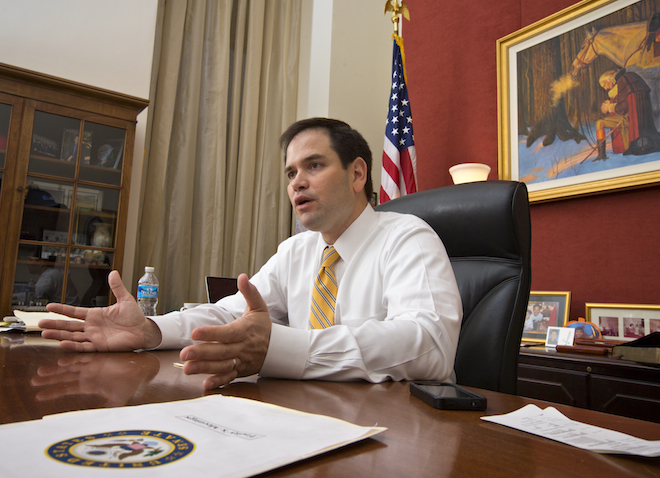Things got pretty testy between Marco Rubio and the White House this weekend as the Florida senator declared a leaked administration proposal on immigration reform “dead on arrival,” “half baked,” and “seriously flawed.”
So is this a sign that negotiations are breaking down as Rubio is pulled to the right? It could be. But the weekend’s blowup is pretty much what one would expect from Rubio in the best of worlds for immigration reform.
Consider Rubio’s political position. As a likely 2016 presidential contender, Rubio is taking a huge risk backing immigration reform. The last time there was a debate on the issue, it sparked a backlash from grassroots conservatives so intimidating that even the biggest Republican champions of a bill had to masquerade as hardliners for several years. And that was when a Republican President was leading the charge.
Not wanting to be seen as a shill for a Democratic President’s signature achievement, Rubio’s strategy from the start has been to play up his differences with the White House as much as possible. This weekend’s outburst was only the latest incident: in interviews with the Wall Street Journal, Bill O’Reilly, Rush Limbaugh, and other conservative thought leaders, Rubio has positioned himself as the right-wing antidote to a far-left White House on immigration.
This touring indignation act isn’t just for Rubio’s own benefit. The Republicans he needs to win over to pass a bill will be a lot more comfortable if they think they’re somehow thumbing their nose at Obama by voting for it. We’ve seen this dynamic on other issues in recent weeks, most notably the debt ceiling, where conservative Republicans delivered a lot of macho partisan talk about a bill that was objectively a huge cave to the White House. If a compromise bill ends up passing, expect to see a lot of statements from Republicans supporters about how they stopped some non-existent White House “amnesty” bill.
Newt Gingrich acknowledged the political environment in an appearance on ABC’s This Week on Sunday, saying an Obama-led bill could never pass the House, not because of its substance, but because of “the level of hostility towards the president and the way he goads the hostility” on the right.
Meanwhile on the policy side, nobody’s even sure what Rubio and the White House are arguing over exactly.
Rubio has signed on to a bipartisan plan in the Senate that’s premised on the same broad planks as the White House’s 2011 and 2013 plans, often using identical language to describe them: a pathway to citizenship for undocumented immigrants, a crackdown on employers who hire future undocumented workers, additional border security measures, and a fix to the legal immigration system to bring in future workers. And since White House officials say they’ll only release their bill if Congress can’t pass one themselves, Rubio’s group — which Obama has showered with praise — is still the lead player in negotiations.
Of course, the devil is in the details, and that’s where Rubio’s been picking fights. In the biggest standoff, Rubio has insisted that his bill’s pathway to citizenship only kick in after a number of border security measures go into effect, an idea the White House is not too fond of. Immigrant rights groups are concerned about the trigger as well, but so long as the metrics are easily quantified and met, it’s not likely to be a dealbreaker since both sides are already planning to include a bunch of security measures in any bill (the leaked WH plan hires a bunch of border patrol agents).
The differences are even less defined on the other items Rubio attacked the White House over on Saturday: failing to include a plan for future immigrant labor in its leaked draft and backing a “special pathway” to citizenship for undocumented immigrants. That’s because Rubio and his Senate buddies haven’t come up with plans for these issues either. On the worker front, everyone’s waiting to see if labor and business groups can work out a compromise on how to deal with future immigration and then move from there. As for a “special pathway” to citizenship, Obama has used the same rhetoric as Rubio, repeatedly saying that undocumented immigrants would have to “go to the back of the line” behind legal immigrants who have already applied for a green card or citizenship. It was in his State of the Union address just this month.
It’s possible Rubio and Obama will end up far apart on these issues and that there’s a crisis looming for reform. There are big questions about whether the Senate’s path to citizenship will leave millions of immigrants waiting decades for a green card, whether labor or business will accept a deal on guest workers, or how the border “trigger” will work. But since nobody involved has released much beyond vague guidelines, most reformers are still reserving judgement as to Rubio’s motives.
“That’s what we’ll be finding out,” Ana Avendano, the AFL-CIO’s point person on immigration, told TPM last week. “Whether [Rubio] can lead his party to the future or just continue to talk like a politician.”
It’s worth noting that Rubio has already committed himself to the part of reform conservatives hate the most — a pathway to citizenship for illegal immigrants — so the political benefits of backing out at this point are pretty weak. If his opponents want to demagogue him on the issue in 2016 they’ll have all the ammo they need regardless of whether a bill passes. Mitt Romney took out Rick Perry by tying him to tuition breaks for young immigrants, never mind citizenship. And since Rubio is being held up by the GOP as its savior in large part because they think he can appeal to Latino voters, he has a lot more to gain if he can plausibly claim he was the dominant player in passing a bipartisan bill that’s popular with said Latino voters.






